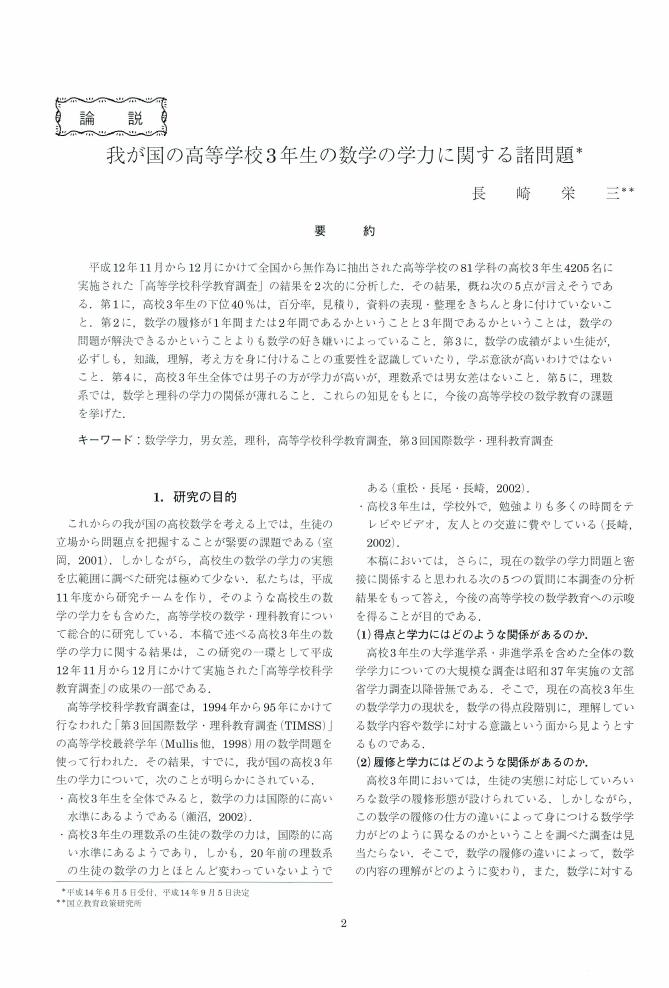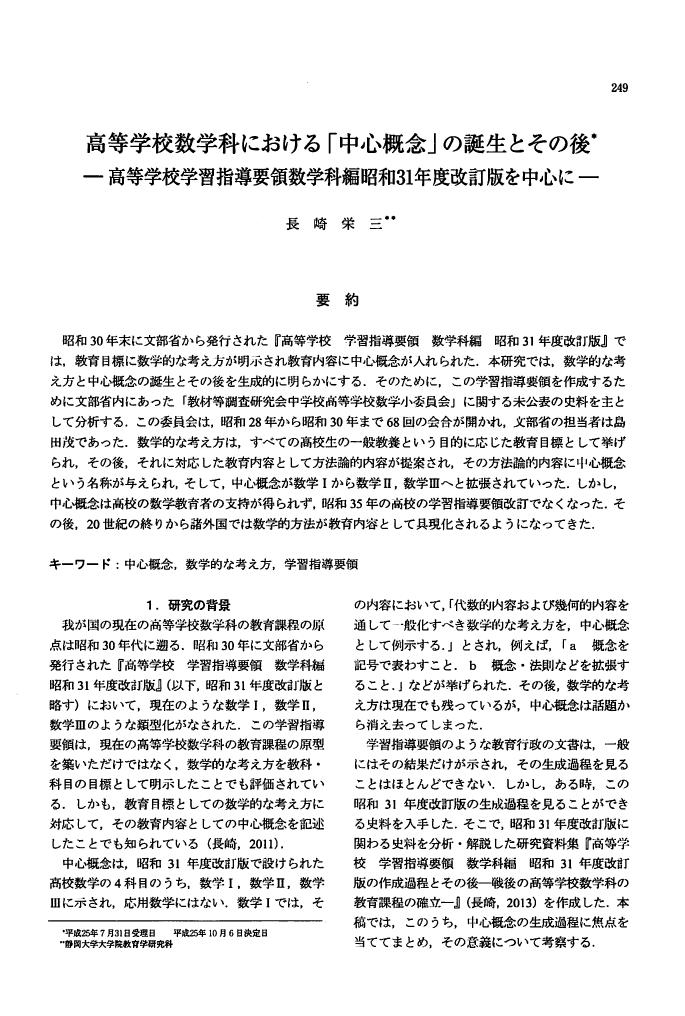64 0 0 0 OA 現在の学問や職業で使われている算数・数学 「数学教育に関する研究者調査」の結果の分析
- 著者
- 長崎 栄三 國宗 進 太田 伸也 長尾 篤志
- 出版者
- 公益社団法人 日本数学教育学会
- 雑誌
- 日本数学教育学会誌 (ISSN:0021471X)
- 巻号頁・発行日
- vol.88, no.3, pp.29, 2006 (Released:2021-04-01)
- 著者
- 長崎 栄三 國宗 進 太田 伸也 長尾 篤志
- 出版者
- 公益社団法人 日本数学教育学会
- 雑誌
- 日本数学教育学会誌 (ISSN:0021471X)
- 巻号頁・発行日
- vol.88, no.2, pp.29, 2006 (Released:2021-04-01)
2014(平成26)年7月にイギリスで「算数・数学教科書の研究と開発に関する国際会議(ICMT2014)」が開催された.算数・数学教科書の研究と開発に焦点を当てた国際会議としては初めてのものである.本稿においては,このICMT2014を通して,国際的な視野から,算数・数学教科書のあり方,開発状況,ICT活用などについて考察する.この会議では,3日間に,全体講演・シンポジウムが4件,口頭発表が79件あった.口頭発表は,次の七つの分科会に分けられていた.1)教科書研究,2)教科書分析,3)教科書比較,歴史,4)教科書使用,5)教科書開発,6)教科書へのICTの統合,7)数学教科書における他学科,他学科の教科書における数学.これのうち,全体講演,教科書の開発,ICT活用などについて紹介するとともに,算数・数学教科書とその研究のあり方,すなわち,算数・数学教科書は知識だけではなく思考の材料としても構成されることがあり,デジタル教科書を考える視点は協働と相互作用にあるということ,そして教科書のグローバル化などについて論じた.
5 0 0 0 OA 我が国の高等学校3年生の数学の学力に関する諸問題
- 著者
- 長崎 栄三
- 出版者
- 公益社団法人 日本数学教育学会
- 雑誌
- 日本数学教育学会誌 (ISSN:0021471X)
- 巻号頁・発行日
- vol.85, no.3, pp.2, 2003 (Released:2021-04-01)
4 0 0 0 高等学校の教育のあり方
3 0 0 0 OA 高等学校における離散数学を中心とした新たな教材の開発研究
2 0 0 0 OA 算数・数学の学力と数学的リテラシー(<特集>公教育とリテラシー)
- 著者
- 長崎 栄三
- 出版者
- 一般社団法人 日本教育学会
- 雑誌
- 教育学研究 (ISSN:03873161)
- 巻号頁・発行日
- vol.70, no.3, pp.302-313, 2003-09-30 (Released:2007-12-27)
Mathematical academic abilities and mathematical literacy is considered from the Japanese and international context. On considering academic abilities and literacy, a framework that grasps those is discussed. There is an ambiguity of the words, 'academic abilities' and 'literacy'. As a measure for overcoming the ambiguity, three levels of curriculum that was proposed by the International Association for the Evaluation of Educational Achievement -IEA- is recommended to use: intended curriculum, implemented curriculum and attained curriculum. Firstly, the change of mathematical academic abilities and mathematical literacy since the Meiji era is summarized focusing on educational objectives and objectives for evaluation of primary and secondary mathematics education. Mathematical academic abilities and mathematical literacy in the Meiji era were composed of computational skills as substantial discipline and spiritual training as formal discipline. Through the scientific spirits by Kinnosuke Ogura and the mathematical considering or methods by Ryoichiro Sato in Taisho era and the mathematical thought by Naomichi Shiono in the beginning of Showa era, ways of mathematical thinking has been aimed after the war and enjoyment of mathematical activities is currently added as objectives. Mathematical literacy has been advocated since the 1980's by a group of Japanese mathematicians with upper secondary and university mathematics education in mind. Next, it is revealed based on the Japanese situation that mathematical academic abilities and mathematical literacy are different as views on mathematics education are different. Mathematics, education and mathematics education have their own views on such, and different abilities and literacy are identified based on the three views. In views on mathematics education by mathematics or education, objectives for its education tend to acauire mathematics knowledge and skills. ln view on mathematics education by such, objectives for mathematics education are to foster abilities and attitudes to think mathematically. It has its view of learning that children create their own. They are also discussed in other countries. In some countries, standards on mathematics processes as well as standards on mathematics contents are set. In the standards on the processes of such, representation, reasoning, communication, connection and problem solving are included. With reference to these discussions mentioned above, methodology for constructing mathematical academic abilities is described based on the view of mathematics education as follows: structuralizing mathematical academic abilities as objectives, systematizing instruction to foster it and concretizing evaluation of mathematical academic abilities. Finally, both content aspects and cognitive/affective aspects are proposed as mathematical academic abilities. bearing both children's growth and social development in mind. Regarding on mathematics content aspect, mathematics expressions and mathematics proof are included. Five strands of cognitive/affective aspects: 'understanding', 'processing', 'thinking', 'using' and 'enjoying' are proposed to foster mathematical academic abilities through learning the content. As future tasks, empirical research on mathematical academic abilities bearing educational values in mind and teacher education are presented.
2 0 0 0 OA 日本の科学教育における科学的リテラシーとその研究の動向 (特集 科学的リテラシー)
- 著者
- 齊藤 萌木 長崎 栄三
- 出版者
- 国立教育政策研究所
- 雑誌
- 国立教育政策研究所紀要 (ISSN:13468618)
- 巻号頁・発行日
- vol.137, pp.9-26, 2008-03
2 0 0 0 OA 教科書の編纂・発行等教科書制度の変遷に関する調査研究 : 算数(数学)科の教科書の著作者
1 0 0 0 OA 数学的リテラシーについての生涯モデルの構成とその理論的枠組に関する研究
- 著者
- 長崎 栄三 太田 伸也 大谷 実 久保 良宏 重松 敬一 瀬沼 花子 滝井 章 阿部 好貴 島田 功 長尾 篤志 西村 圭一 日野 圭子 松元 新一郎
- 出版者
- 静岡大学
- 雑誌
- 挑戦的萌芽研究
- 巻号頁・発行日
- 2012-04-01
第1に、成人期の数学的リテラシーの捉え方について次の3点から考察した。個人と組織が求める数学的リテラシー、幸せに生きるための数学的リテラシー、不確定な社会における社会人に持っていて欲しい数学的リテラシー、第2に、民主主義社会などを念頭において数学的リテラシーとして次の4つの領域からその内容・視点を考察した。人間にとっての算数・数学、算数・数学における対象、算数・数学における方法、社会にとっての算数・数学。第3に、「すべての人々」について検討を行い、算数・数学における子どもの多様性から考察した。
- 著者
- 長崎 栄三
- 出版者
- 公益社団法人 日本数学教育学会
- 雑誌
- 日本数学教育学会誌 (ISSN:0021471X)
- 巻号頁・発行日
- vol.95, no.RS, pp.249-256, 2013-11-16 (Released:2021-04-01)
- 被引用文献数
- 1
1 0 0 0 OA 数学第一類・第二類の検定教科書の編纂とその思想 : 戦時下の中学校数学教育
- 著者
- 長崎 栄三
- 出版者
- 国立教育研究所
- 雑誌
- 國立教育研究所研究集録 (ISSN:02850125)
- 巻号頁・発行日
- vol.21, pp.43-56, 1990-09
1 0 0 0 OA 1PB-22 初等教員養成課程の大学1年生の基本的な数学の力の日英比較
- 著者
- 長崎 栄三 ウィットバーン ジュリア 久保 良宏
- 出版者
- 日本科学教育学会
- 雑誌
- 年会論文集
- 巻号頁・発行日
- vol.26, pp.203-204, 2002-09-12
1 0 0 0 OA 社会的文脈における数学的判断力の育成に関する総合的研究
本研究は,わが国の子どもに,「数学的論拠に基づいて,事象を分析,解釈し,意志決定する能力」である「数学的判断力」の育成することを目的としたものである。数学的判断プロセスを規定し,数学的判断力に関する実態調査を実施するとともに,数学的判断におけるプロセス能力の水準化や,そのプロセス能力と数学の内容・選択支援・社会的価値観・他者との相互作用の五つの軸によって構成される授業の枠組みを作成した。そして,小・中・高校で実験授業を実施し,その有効性について実証的に検討した。
- 著者
- 長崎栄三
- 出版者
- 日本数学教育学会
- 雑誌
- 数学教育論文発表会論文集
- 巻号頁・発行日
- no.24, pp.305-310, 1991-11-21
- 被引用文献数
- 1
戦前の数学教育再構成運動の成果として昭和18年から19年にかけて発行された中学校数学科の1種検定教科書『数学第一・二類』は、生徒が数学を作り出すという発想のもとで作成されたという。本研究は、この教科書の題材などに焦点を当てて、この生徒が数学を作り出すという発想を量的に分析したものである。その結果、次のことが分かった。(1)理科、社会、保健、技術などの他教科や実社会に関連した題材などが多く取り入れていること。(2)図的表現には、実際の情景を描写した図的表現、少し数学化された中間的な図的表現、数学化された図的表現の3種類があり、しかも、前者2者の図的表現が多い。(3)一般的な求答活動に加え、考ヘヨ、シラベヨ、ドンナ関係ガアルカ、工夫セヨなどが多く求められている。
1 0 0 0 IR 統計的思考力育成のための複合デジタル教材 : 数学科で活用する『科学の道具箱』
- 著者
- 酒折 文武 西村 圭一 竹内 光悦 田村 義保 深澤 弘美 渡辺 美智子 長崎 栄三
- 出版者
- 日本数学教育学会
- 雑誌
- 日本数学教育学会誌 (ISSN:0021471X)
- 巻号頁・発行日
- vol.92, no.1, pp.20-28, 2010-01-01
- 参考文献数
- 15
- 被引用文献数
- 2
学習指導要領の改訂が告示され,中学校数学科に「資料の活用」領域が設けられるなど,中高において統計の内容が充実されたことで,数学教育における統計の学習のあり方に注目が集まっている.しかし同時に,新しく「活用」という視点が入った統計の学習の実践を効果的に展開するための教材および授業モデルの開発研究が喫緊の課題である.本研究では,科学技術振興機構(JST)の「初等中等教育における統計的能力の育成を目的としたデジタル教材」により,「算数・数学における資料の活用とデータ分析のための複合デジタル教材『科学の道具箱』」を開発した.その背景や概要,授業での活用方法について述べた.
1 0 0 0 OA 島田 茂 先生のご逝去を悼む
- 著者
- 長崎 栄三
- 出版者
- 東京理科大学
- 雑誌
- 理学専攻科雑誌 (ISSN:02864487)
- 巻号頁・発行日
- vol.41, no.2, 1999
1 0 0 0 IR 算数・数学教育の目標としての「算数・数学の力」の構造化に関する研究
- 著者
- 長崎 栄三 国宗 進 太田 伸也 五十嵐 一博 滝井 章 近藤 裕 熊倉 啓之 長尾 篤志 吉川 成夫 久保 良宏 上田 雅也 牛場 正則 日下 勝豊 塩野 友美 島崎 晃 島田 功 榛葉 伸吾 西村 圭一 早川 健 藤森 章弘 牧野 宏 松元 新一郎 望月 美樹 森 照明 藤村 和男 半田 進 家田 晴行 松田 泉 浅沼 健一 小俣 弘子 清水 壽典 村越 新 安部 浩一 飯嶌 一博 久永 靖史 山根 浩孝 山口 啓
- 出版者
- 公益社団法人日本数学教育学会
- 雑誌
- 日本数学教育学会誌 (ISSN:0021471X)
- 巻号頁・発行日
- vol.90, no.4, pp.11-21, 2008-04-01
- 被引用文献数
- 5
算数・数学教育における新たな目標として「算数・数学の力」を考えた.算数・数学の力とは,算数・数学のあらゆる活動に関わるはたらきで,大きく「算数・数学を生み出す力」,「算数・数学を使う力」,「算数・数学で表す力」,「算数・数学で考え合う力」の4つの力で構成される.初めに,我が国の算数・数学科の教育課程の史的分析,算数・数学のカリキュラムの国際比較,算数・数学教科書の研究,数学的な考え方・問題解法の史的分析,社会の算数・数学教育に関する意識の分析を行った.その上で,算数・数学教育の目的・目標に算数・数学の力を位置付けた.そこでは,算数・数学教育の目標を概念理解と能力習得とで均衡を図った.そして,算数・数学の力を,算数・数学的内容との一体化,算数的活動・数学的活動の重視などの原則の下で構造化し,その質の高まりを具体化するための算数・数学の力の水準の重要性を指摘した.



